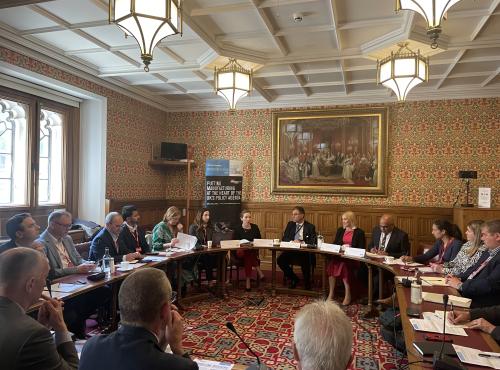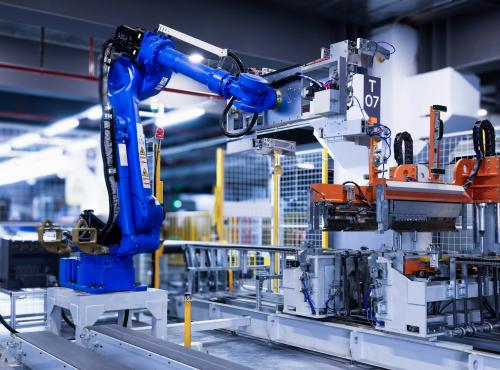Upskilling Industry: Manufacturing productivity and growth in England
The Manufacturing Commission calls for greater support for businesses to navigate further education reforms and upskill their workforce for a digital future.
Today, Lord Bilimoria of Chelsea CBE DL, will launch Policy Connect’s latest report – Upskilling Industry: Manufacturing Productivity and Growth in England, alongside Mark Pawsey MP and Sarah Olney MP. The Manufacturing Commission’s inquiry considers the implications of recent skills system reform in England on the manufacturing sector.
Labour shortages are restricting productivity across the economy, with skills gaps in the manufacturing sector costing between £7.7 and £8.3 billion annually in lost economic output. Skills shortages have been further compounded by the UK’s departure from the EU and the COVID-19 pandemic, both of which have reduced the manufacturing sector’s access to skilled labour.
England’s secondary, further, and higher education systems currently fail to deliver graduates with the skills required to succeed in the green and digital economies of the future. Recent reform to post-16 technical education through the Skills for Jobs White Paper and subsequent Skills and Post-16 Education Act has sought to address this.
The Manufacturing Commission’s inquiry explores the challenges of upskilling the manufacturing workforce in England and draws on evidence from parliamentarians, civil servants, academics, NGOs, and industry stakeholders. It examines how recent further education reform can be best navigated by businesses, education providers, and individuals.
The report makes recommendations to government, calling for:
-
Support for SMEs in the manufacturing sector to help upskill their workforce, including incentives to deliver T-Levels and host Skills Bootcamps.
-
Greater flexibility in the use of the Apprenticeship Levy funds, including ring-fencing of unused Levy funding for investment in wider upskilling.
-
A national campaign to increase the uptake of STEM subjects by women and people of minority ethnic backgrounds.
-
Appointment of a government manufacturing ‘Champion’ to raise awareness of the manufacturing sector in schools and promote the role that the manufacturing sector is playing in combatting the climate crisis.
Inquiry Chair, Lord Bilimoria of Chelsea, CBE, DL
“As Chair of the Manufacturing Commission and a proud supporter of British manufacturing, I am delighted to have been involved with this inquiry, which considers the impact of skills shortages across the sector.
Throughout the evidence sessions that have informed this work, I have been inspired by accounts from manufacturing businesses that are using all levers available to them to upskill their workforces. The recommendations that we have made seek to help businesses, education providers, and individuals best navigate the current policy landscape and deliver the skills that the manufacturing sector so vitally needs.”
Inquiry Vice-Chair, Mark Pawsey MP
“As a member of the Business and Trade Committee and co-chair of the All-Party Parliamentary Manufacturing Group, I regularly hear of the skills shortages that limit productivity within the UK’s manufacturing sector. This inquiry explores how businesses can collaborate better with education providers to deliver the skills that local communities need. This is particularly important in the West Midlands, which is home to a significant part of the UK’s automotive and future battery technology capability.”
Inquiry Vice-Chair, Sarah Olney MP
“The manufacturing sector has a vital role to play in the future green economy, including the development of the technologies that all industries will need to decarbonise. Increasing the uptake of STEM learning in schools, particularly by women and people of minority ethnic backgrounds, will be key to developing the highly skilled workforce that the manufacturing sector needs to deliver on net zero. I am pleased to have been able to facilitate the discussions that have informed this report.”
Report author, Rob Allen
“The challenge to develop a skills system that can deliver a sustainable workforce to meet the needs of a digital and green manufacturing sector is a significant one. This has been compounded by recent events, such as the UK’s departure from the EU and the COVID-19 pandemic, which have reduced the pool of skilled labour from which the manufacturing sector can draw.
However, recent reforms to post-16 education and training in England can help to address this challenge, by creating skills system that is more devolved and employer-led. The recommendations in this report aim to build on these reforms and help businesses, education providers, and individuals too close the skills gap.”
Notes to Editors
For further information, please contact Victoria.Zeybrandt [at] policyconnect.org.uk (Victoria[dot]Zeybrandt[at]policyconnect[dot]org[dot]uk)
The report is sponsored by Coventry University, the ERA Foundation, Lloyds Bank, the Manufacturing Technologies Association, and Warwick Manufacturing Group.
About Policy Connect
Policy Connect is a cross-party think tank. We specialise in supporting parliamentary groups, forums and commissions, delivering impactful policy research and event programmes and bringing together parliamentarians and government in collaboration with academia, business and civil society to help shape public policy in Westminster and Whitehall, so as to improve people’s lives.
Our work focusses on five key policy areas which are: Education & Skills; Industry, Technology & Innovation; Sustainability; Health; and Assistive & Accessible Technology.
We are a social enterprise and are funded by a combination of regular annual membership subscriptions and time-limited sponsorships. We are proud to be a Disability Confident and London Living Wage employer, and a member of Social Enterprise UK.
About the Manufacturing Commission
The Manufacturing Commission is run by Policy Connect’s Industry, Technology, and Innovation team. The Commission brings together Parliamentarians, leading figures from across the manufacturing sector, and academics to undertake high-level research into UK manufacturing policy making recommendations to government and industry. The Commission is currently chaired by Lord Bilimoria CBE, DL.



